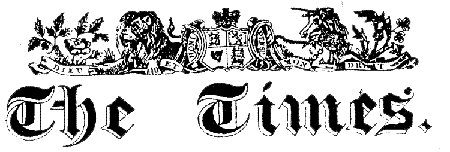MAY 23, 1849, IRELAND
(From Our Own Correspondent.)
DUBLIN, Tuesday Morning.
THE FAMINE IN THE WEST
The Protestant rector of Ballinrobe, in a third letter addressed to the Premier, narrates the following horrifying tale of human misery:
"In a neighboring union a shipwrecked human body was cast on shore; a starving man extracted the heart and liver, and that was the maddening feast on which he regaled himself and his perishing family! and nearer still a poor forlorn girl, hearing that her mother was seized with cholera, hastened to the rescue, alas! too late, but with a deep religious and filial devotion, desiring at least a decent interment for her dear departed parent, was driven to the shocking necessity of carrying the corpse upon her own back for three long miles to this very union, so that she might make her wants known, and simply obtain a coffin from the relieving officer. Need I tell you, my Lord, the dismal sequel? She herself died of cholera the next day. Those awful facts may have been reported, but if they were they have been cushioned and suppressed, for who has heard of them?"
With such fearful occurrences passing before his eyes, it is no wonder that the rev. writer should speak in such impassioned language as this:
"I will not, my Lord, dwell at present upon the painful subject of the workhouse, as the evil has gone far to correct itself, the inmates having died in awful numbers, and more liberal supplies being now remitted for the current weekly expenses -- alas! that those supplies should have been withheld so long! I would, however, fix your Lordship's deepest attention upon the appalling fact, that we have, even at best, to encounter three months more of sore, sore famine; and bear it in mind, my Lord, the three worst months of the year, in point of home supply -- and this, with 27,000 of our population in the Ballinrobe union on outdoor relief, while the remaining 68,000, minus the thousands already lost, are all, with very few exceptions indeed, barely trying to hold on through the dread crises? The all engrossing questions with every case, gentle and simple, are these -- "What, in the name of Heaven, is to become of us? What are we to do? The country is gone!" We must thus again and again strive to arouse you, my Lord, for it is not possible that your or the English people can be fully conscious or alive to the true state of things in the west of Ireland. I grant that there may be, nay, that there is, much of imposition, but surely there cannot be any n this, that here are the people dropping dead of utter want all around in every direction, night and day; and can we suppose for a moment that the astounding fact is believed when we see no really vigorous and united movement, except through private benevolence, to stay the progress of death? 'Tis poor consolation to an already more than half-starved wretch to say to him -- "Go and break stones, no matter how unprofitable, for that is the sole test of your destitution, and if the contractor don't disappoint, you shall get for your eight or ten hours labour 1 lb. of Indian meal, which costs 1d. but we can't give you fuel or clothing.' Still you 'must deliver the tale of bricks;' however, if you'd die, and die you soon must, for your emaciated, famine-stricken countenance and swollen frame, betoken as much, you will, as on the outdoor list, be entitled to a coffin from the relieving officer, though, perhaps, he may not hear of your decease till you have become putrid in the grave! I tell it to you, my Lord, whether believed or not, and I tell to the world at large, and I tell it to our Father in Heaven (for I beseech redress of Him), that these are the sufferings of this people despite of every entreaty, but not of half the people; for who can imagine the thousandth part of the misery of those who, in large numbers, are preferring death itself to such degradation? It is a burning shame and stain upon the legislature in any so-called Christian country."
![]()
